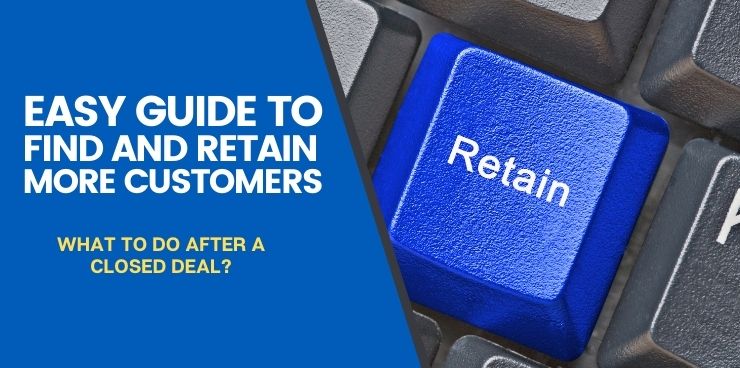Say that you made a new friend. This can be back in the day when you were a child or teenager, or a recent event.
So you meet your new pal. Say that you spend time together for the first time. Maybe you share a phone call or go out for a meal.
After that first interaction when you finally meet up, what do you do? Do you consider that initial hang-out the end of your friendship efforts, even if everything went well? Do you stop checking in on one another and assume that your friendship is still active?
No. And likewise, after a closed deal with a customer, you cannot consider it the end of your professional relationship either.
Today, let’s talk about the steps you can take after a closed deal. These steps allow you to retain customers, boost referrals and build a mutually beneficial relationship.
 Sales Closed, So What?
Sales Closed, So What?
The idea of “how to close” varies by a salesperson. But you or your team members put a lot of hard work into your sales closing techniques, regardless of how you go about it.
But what do you do following a closed deal? Let’s go over a few scenarios where you might find yourself thinking “I closed the sale, now what?”
You might be thinking “Alright! I closed!” and then you let that be the end. A lot of people only close once– and that is where they err. You cannot close one time and forget about that sales closure. Instead, do it multiple times throughout the selling process.
Maybe you tend to close using statements instead of questions. Now, you could be wondering why that customer did not return to buy from you again. You need to ask clear questions so that they can provide clear answers. Consider the power of an assumptive question, too.
You also might “step” on closed sales. This is when you finish your assumptive question (after sealing the deal) with an “or” question. For example, imagine you have a closed deal. When you follow up, you ask “How does tomorrow sound for a quick meeting?” When you do not get an immediate response, you scramble and say “Or would later this month be more convenient?”
Any of these scenarios might be relevant to you or your sales team. If you experience any of this hesitation after a closed deal, do not get down on yourself. Keep reading for seven of our expert-approved things to do after you or one of your reps seals the deal.
Do You Have a Process for Closing a Deal?
Before we can get into those seven steps, though, we have to go over one more thing.
What is your current process for closing sales?
You must identify what it is right now. Then, you can pinpoint where your current process has room for improvement and where it stands out.
Do you use a Ben Franklin close method? That is where you collaborate with your prospect to draft a pros and cons list about a particular product or service. The idea is to help you understand what your prospect wants. It also shows them how what you sell will benefit them.
Others yet use a direct close. This is when a rep out-front asks the prospect if they want to buy. But you can only use this when you are 100-percent positive that you will get a resounding “yes” in response.
Both of these, and many more, have some flaws. So if you want to perfect the art of closing the sale, follow our seven tips below.
7 Things You Can Do After the Deal is Sealed
You will find a lot of resources out there about processes you should follow after a closed deal.
But we went through and vetted those tips and tricks to give you this easy-to-follow guide. Try out all seven of these pro tips. You will find yourself with improved customer relationships, more solid referrals and an A-plus customer lifetime value.
Understand Every Decision Made
You should use this step both before, during, and after a closed deal.
The bottom line is simple. You need to understand how your prospect and their organization make decisions.
To do so, ask them these questions:
- How will you make your decision? What factors contribute to your final decision?
- Who else has a say in your decision?
- What is your decision-making process? Walk me through it.
- How do you decide if our solution is a perfect fit for your company?
Make an Effort to Upsell
Right after your client makes the purchase, they go through a “honeymoon” period with your product or service. They get to know the product and experience its results in real-time.
The next time you talk to your client, you should be able to measure those results and their success with them.
When the two of you do have that next conversation, it is the ideal time to upsell.
Do they love the product or service? If so, they have every reason in the world to take their experience to the next level.
Make sure, however, that you can identify when the time is right. Do not upsell too quickly after a closed deal. You could risk destroying the relationship you built so far by intimidating them.
If you upsell too late into their buyer journey, they might have already lost interest.
Keep the right attitude and follow the right timeline. Then, upselling is a natural next step after your initial close.
 Stay Focused
Stay Focused
We get it: it is easy to want to celebrate after you first close a sale.
But you need to avoid that feeling for a little bit longer, or you lose focus.
After you close, take advantage of that burst of energy and positive attitude. Call or reach out to another qualified prospect and try your hand at closing that sale, too.
The most successful salespeople zero in on their initial success and build on it. They spend their weekends or time off celebrating their multiple successes.
Do Not Make Promises Only to Break Them
Everyone wants to surround themselves with trustworthy people. That’s true across the board. But with sales in particular, you have to elevate that trust.
The best way to go about doing that is through keeping your promises after a closed deal.
When your buyer makes it official and agrees to purchase, you have an obligation to them. You need to follow through with everything you agreed to with them.
Ignore that thorn in your brain that whispers: “Do it! Offer them bonuses and perks! Anything you can to get them to say ‘yes!’”
If you make promises you cannot possibly deliver on, you will soon regret it.
Your audience can recognize when you see them as a paycheck instead of a person. So when you entice them with false promises, you hurt your (and your company’s!) reputation.
Making promises is good. But only do it when you know with absolute certainty that you can keep them.
Know You Are Never Done Selling
This one may seem obvious. After all, we are talking about what to do after a closed sale; naturally, you realize there is a next step to continue the selling process.
But we need you to comprehend all that goes into your efforts after a closed deal, like:
- Putting the solution into effect
- Following up with client communication so that you retain them
- Upselling/tacking on extra products to the primary purchase
- Getting worthwhile referrals
- Ensuring your promises come true
- Setting a standard
- Communicating the benefits of what you sell
- Identifying new opportunities that stem from your first one
Get Honest Feedback
You cannot know how to improve without feedback after you seal the deal.
Send your new customers a brief but comprehensive survey. It should contain questions about your sales performance as a whole, but also dive into the deeper details. You want to be able to glean measurable information from their responses for your own analysis.
There are plenty of survey sites, like SurveyMonkey. Click here for a more exhaustive list of your options.
Encourage total honesty in customer responses. You need that to get a closer look at your strengths and weaknesses.
Do Not Forget to Say “Thank You”
A brief “thank you” goes a long way.
It’s a matter of manners and proper etiquette, yes. But it goes further than that. If you do it right, it shows timeliness and genuine customer care on your end. Within three days after you close, reach out, even if it is just to thank them for their time.
It personalizes their experience, which is how you retain a customer in the first place. Plus, you get brownie points that help you down the road.
Which is the Most Important Thing You Do After a Sale?
So which is the most important? What should you prioritize most?
The short answer: all of them.
The long one? Building trust is the number one and most important thing to do after a closed deal. It is what buyers value most. And you can only build said trust when you mesh those seven steps together.
Conclusion
Sometimes, you need to look at a real-world example of trustworthy businesses. You need someone to inspire that same feeling in your professional life.
But you are busy. You have leads to follow up on and clients to please. You need to ensure proper sales training and you also want to learn all there is to know about how to improve and grow.
Would you believe us if we told you that you can have all of those things, all from one source?
Go ahead and start believing.
At Selling Revolution, we have decades of experience in helping to grow businesses just like yours. With one stipulation– you are unique and need your own one-of-a-kind solutions to match.
That’s where we need your help.
Choose a date this week that works for you. Then, book a call with us so we can formulate your selling solutions with you as our top priority.


 Sales Closed, So What?
Sales Closed, So What?  Stay Focused
Stay Focused